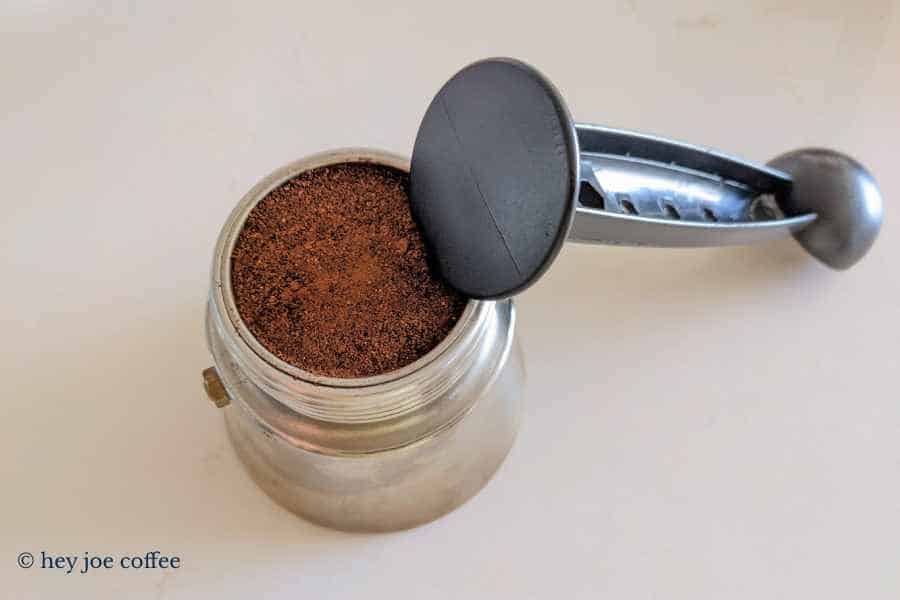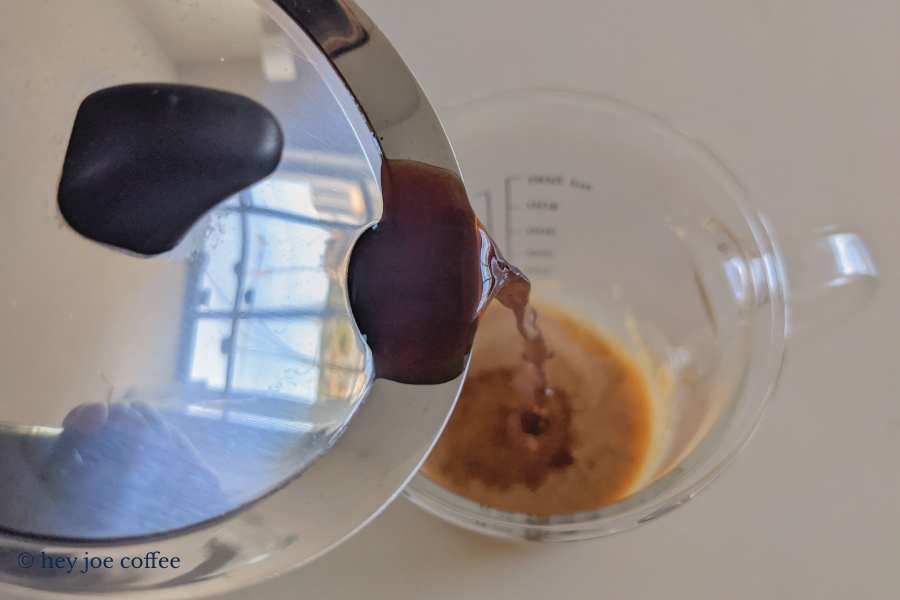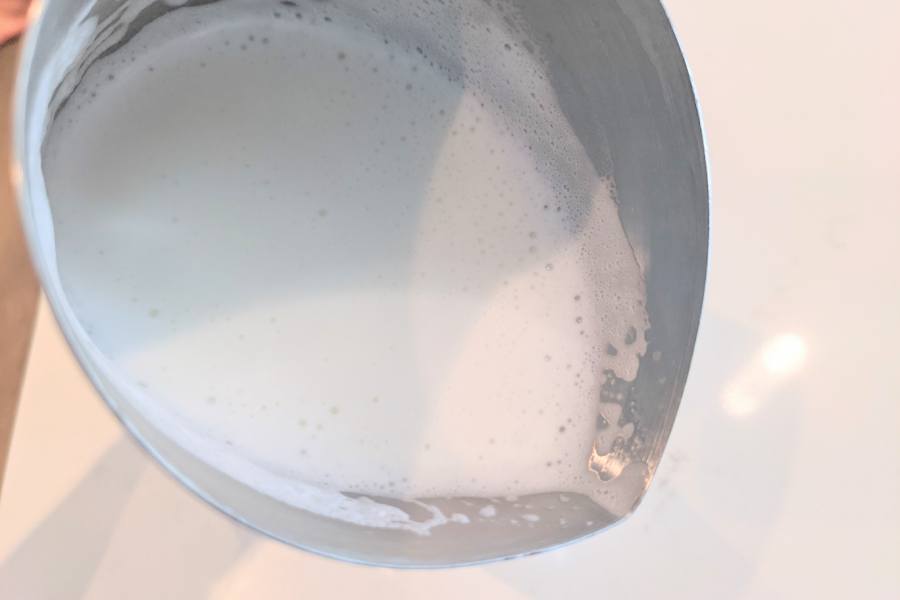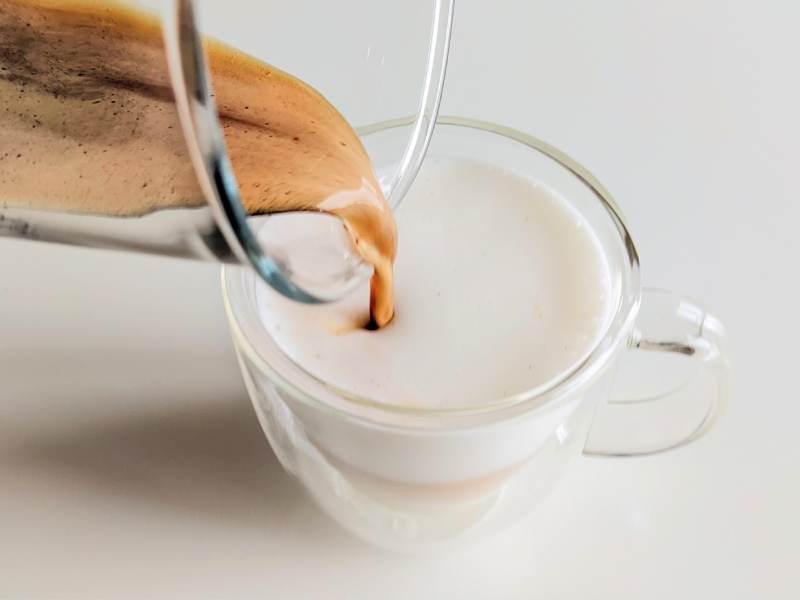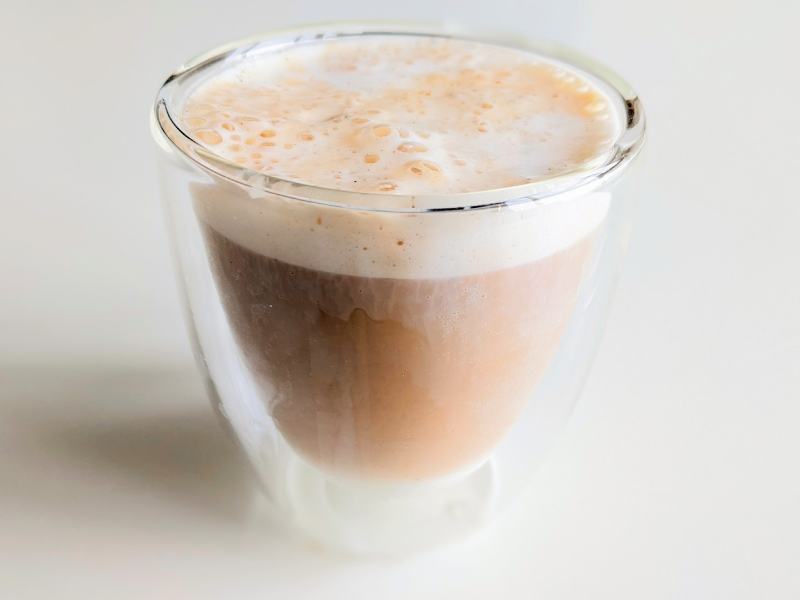Ginseng coffee jumped on the wave of superfoods and made its way into almost every coffee shop. It had some people puzzled, including us.
Is this a new roast infused with the root, or is it prepared like matcha? We went on to find out!
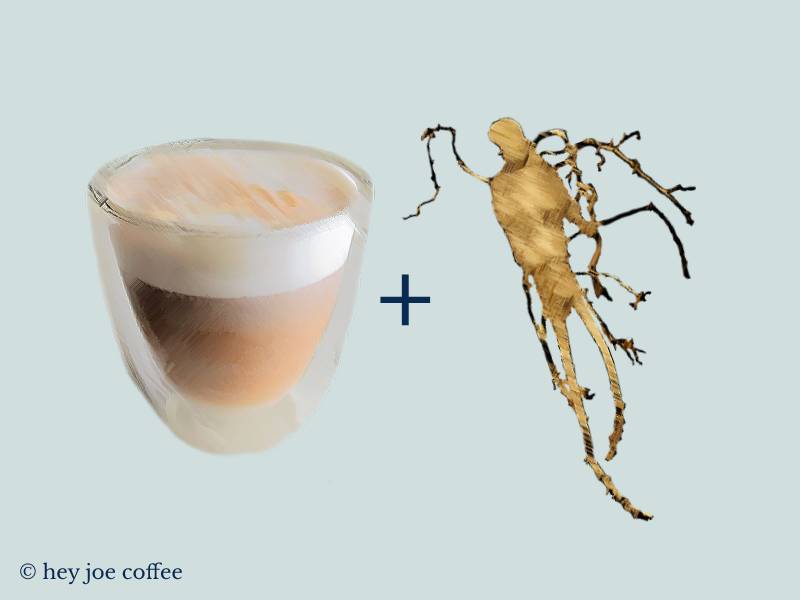
Topics Explored
- What Is Ginseng Coffee?
- What Does It Taste Like?
- How Do You Make Ginseng Coffee?
- Benefits & Side Effects
- More Questions
What Is Ginseng Coffee?
There are two variations to this coffee.
- The first one is considered the healthiest and features brewed espresso with ginseng root extract.
- The second one is a pre-mix consisting of instant coffee and the powdered root. They usually come in individual sachets and may also contain added sugar and creamer.
You can add any type of milk or sweetener to both versions.

The ginseng root is native to Asia, where it has wide use in folk medicine. It’s a mighty antioxidant that boosts your energy and immune system.
There’s no information on who introduced ginseng to espresso, but it’s been brewed for years in Italy and all over Europe.
What Does Ginseng Coffee Taste Like?
The taste of this drink depends on the preparation method.
Ginseng root is bitter. Depending on the roast, coffee can have a bitter flavor profile too. The final drink has a strong medicinal flavor.
However, the pungent espresso taste and the bitter ginseng root are not a favorable combo. So the bitter taste is toned down with milk and sweetener.
How Do You Make Ginseng Coffee?
This coffee is a great way to add more nutrients and antioxidants to your daily cup. But if your local coffee shop doesn’t have it on the menu, we have the perfect recipe.
It might take you some time to get used to the taste, but the benefits are worth it.
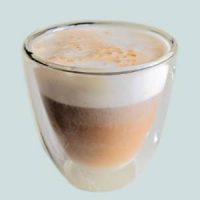
'Wake Up' Ginseng Coffee Recipe
If you are curious about using ginseng coffee to boost your energy levels, look no further! We have a simple yet delicious recipe for you.
Ingredients
- Ginseng Root Powder: ½ tbsp
- Espresso: 1 shot
- Milk: 4 oz
- Sweetener (optional): To taste
Instructions
- Start by brewing one shot of espresso using a moka pot or espresso machine. We want a strong flavor, so other brews won't work.
- Place the sweetener and ginseng root extract into a cup (preferably one with a spout). Then pour the hot brewed espresso over it. Stir to combine well, so there are no clumps.
- Set the coffee aside and get a pitcher for the milk. If you have an espresso machine*, use the steam wand to froth the milk.
- Once the milk has been frothed well, pour it into a serving glass. And finally, top off your milk with the espresso.
- You can stir to combine it or let it sit layered for a more aesthetically pleasing look. There you have your healthy coffee cup of the day!
Notes
*If you don’t have an espresso machine, use a hand held frother or a mason jar. Remember to warm the milk first if using any of these methods.
Benefits & Side Effects
Among the greatest ginseng benefit is the amount of antioxidants it contains. Coffee also contains antioxidants, which makes this drink a potion to protect your cells.
However, more clinical research is needed to verify the health claims of combining these two ingredients in a cup.
Pros
- Improves energy levels
- Enhances brain function
- Prevents diabetes
- Reduces inflamation
Cons
- Potentially react with medication
Benefits
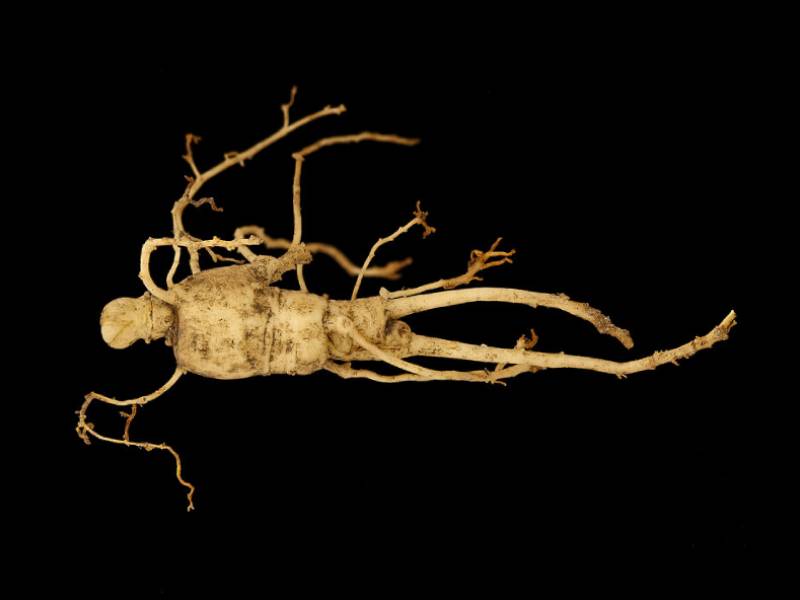
1. Reduces Fatigue
According to a 4-week study(1) on ginseng consumption, the root has improved the consumer’s mood and mental health status.
Caffeine, on the other hand, blocks the neurotransmitter adenosine, delaying the feeling of tiredness and fatigue and making you feel more alert.
2. May Improve Brain Function
Independent studies from 2016 and 2018 proved the effect of ginseng on brain clarity and cognitive deficits. It enhances the function of the frontal lobe, diminishing brain fog and improving your brain function.
Coffee helps lower your risk of Alzheimer’s and Parkinson’s. While it’s not proven to affect already developed sickness, it has 15 to 25% chances of preventing them(2).
3. May Lower Blood Glucose
When consumed at least once a day, coffee helps prevent type 2 diabetes(3). This research continued for 4 years and proved to lower the chances by 11%.
Ginseng improves the work of the pancreas, the most important organ, when it comes to diabetes. Ginseng boosts the production of insulin and controls blood sugar.
4. Acts An Anti-Inflammatory
The active ingredients in ginseng target the chain of nerve cells responsible for reducing inflammation in your immune system(4).
Coffee is rich in hormones such as cafestol, trigonelline, kahweol, and antioxidants. This combination fights inflammation and helps protect your cells.
Side Effects
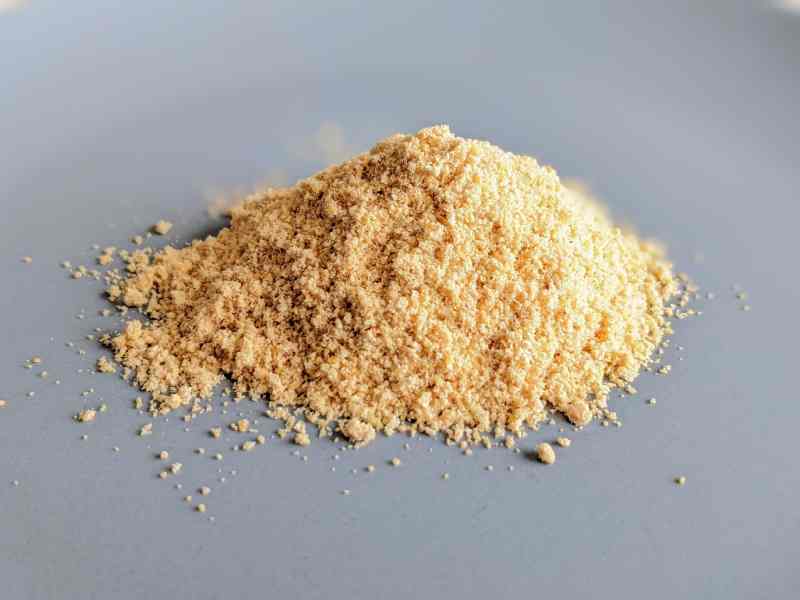
May Interfere With Medication
Ginseng can interfere with some anticoagulants, and it’s not recommended for pregnant or nursing women. If you’re suffering from type 2 diabetes, you must monitor your blood sugar when consuming ginseng.
Coffee might interfere with muscle relaxants. Consult your doctor if you’re worried about this combination not suiting your medical condition.
Summary
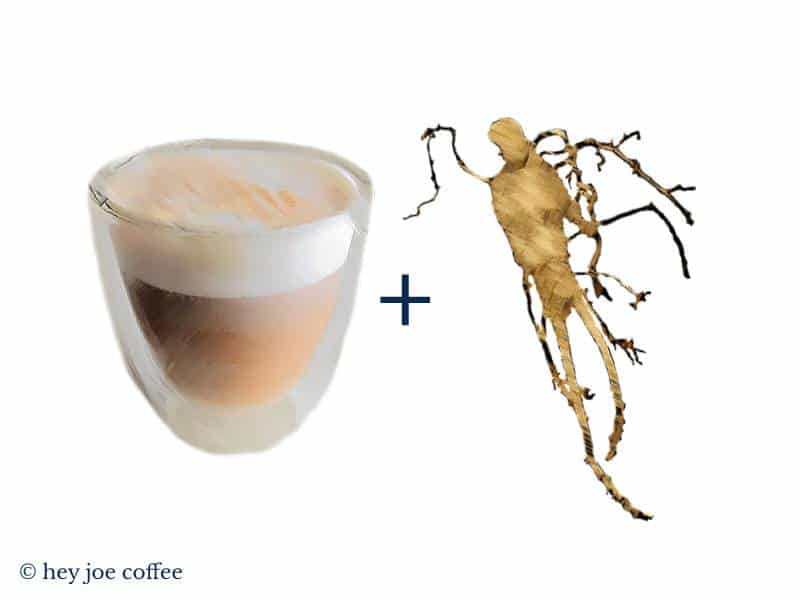
This healthy brew is a great way to reap the benefits of both coffee and this ancient root. Ginseng is a staple in Korean and Japanese herbal medicine due to its many proven advantages.
Coffee with this nutritious root has been popularized in recent years. It’s easy to brew at home; however, it has a specific taste, so you might want to add some sweetness to tone it down.
More Questions
Does ginseng coffee contain caffeine?
Yes, it contains caffeine since it’s made with a shot of espresso. The amount of caffeine depends on the roast you use. Ginseng doesn’t contain caffeine but the active ingredient ginsenosides.
So all the caffeine comes from espresso. But you can use decaf espresso, and you’ll still receive many of the benefits.
Can you mix ginseng and coffee?
You can mix ginseng root extract and coffee, and it’s been done for decades. However, you must be aware that both ingredients are stimulants. They affect several body functions in your brain, blood sugar, and blood pressure.
If you have sensitivity to any of the two ingredients, don’t combine them. Always do your due diligence and speak to your doctor if you’re unsure.
Does ginseng coffee taste good?
Taste is subjective; what tastes great for someone might feel odd for others. Ginseng is inherently bitter, so some won’t enjoy the flavor. It has a distinct medicine flavor.
When you add the pungent taste of espresso, the bitterness is even more pronounced. It’s best to pair it with milk and sweetener to mellow out the taste.
Wondering where your info comes from? We totally understand. Hey Joe only obtains our information from reputable sources. Contents from this article are sourced from the following publications:
- Healthline: https://www.healthline.com/nutrition/ginseng-benefits
- Harvard T.H. Chan: https://www.hsph.harvard.edu/nutritionsource/food-features/coffee/
- Medical News Today: https://www.medicalnewstoday.com/articles/262982
- Healthline: https://www.healthline.com/nutrition/coffee-inflammation

